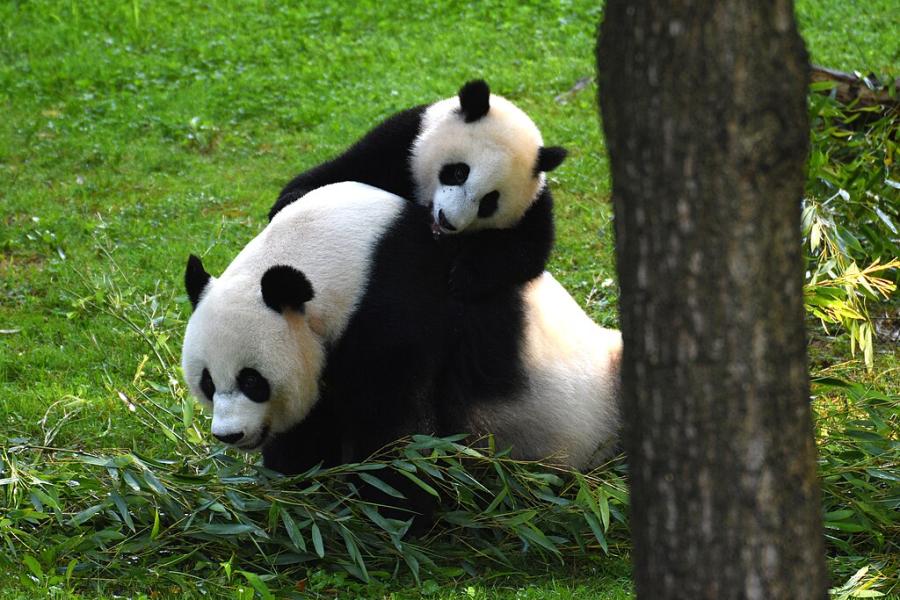- Name
- Jill Rosen
- jrosen@jhu.edu
- Office phone
- 443-997-9906
- Cell phone
- 443-547-8805
One of D.C.'s most famous families has officially left town. No, not the Obamas—the giant pandas at the National Zoo.
On Wednesday morning, Mei Xiang, 25, a female; Tian Tian, 26, a male; and their son, Xiao Qi Ji, 3, were loaded onto shipping crates, where they'll spend 19+ hours en route to Chengdu, China. The beloved family's departure has left Washington residents both bereft and uneasy. Loaned to the U.S. by China, the pandas and their predecessors have pulled double duty as cuddly zoo mascots and symbols of good will between the U.S. and China. Neither country has explained why the zoo's panda contracts weren't renewed, but the lapse feels significant: For the first time in over 50 years, the zoo's panda compound will be empty, effectively leaving an important diplomatic position unfilled. They aren't the only pandas being brought back to China, either; pandas in San Diego and Memphis have already been moved, and the only remaining pandas in the country, located in Atlanta, and their contract with China expires next year.
To learn more about what the National Zoo's vacant panda enclosure means for the U.S.'s relationship with China, the Hub spoke to Ho-fung Hung, professor in political economy in the Department of Sociology at the university's Krieger School of Arts and Sciences and at JHU's School of Advanced International Studies. His areas of scholarly interest include social theory and East Asian development.
What is the backstory on the pandas' arrival in the U.S.? Was their stay here always meant to be temporary?
Panda diplomacy has a long history. In modern times, the Nationalist government (overthrown by the Communists in 1949) did gift pandas to friendly countries, including the U.S. The Communist government also gifted pandas to other communist countries, like North Korea, at the height of the Cold War. After Nixon visited China, China gifted pandas to the U.S. again. In the 1980s, Beijing shifted to loaning pandas with a renewable loan period. Hosting zoos take full responsibility for taking care of the loaned panda and need to pay a hefty sum to China (up to $1 million per panda per year, according to recent media estimations). They are more or less rentals.
Is their forced departure meaningful?
Each renewal of the loan agreement involves negotiation on both sides that outsiders know little about. In the past, renewal was never a problem; most places kept renewing the agreement. But recently, agreements with many zoos around the world were not renewed—not just in the U.S., but in Europe too. We don't know why the negotiation leads to non-renewal and can only guess. I suspect it might be related to the general trend that China has started to feel it should keep the good things to itself rather than sharing, selling, or renting to the world. This happens to rare earth export, accessibility of historical archives, academic databases, etc. In the particular case of the U.S.-China negotiation about the pandas, I suspect it has become the victim of deteriorating relations between the two. Both sides tend to feel the arrangement is mutually beneficial when relations are good. But when relations are generally bad, both sides might feel the other side is taking advantage. In China's social media, there have been complaints about the pandas not being treated well in foreign zoos. In host countries, there have been increasing complaints that the "rent" for the pandas is so high that the hosting zoos just cannot afford them anymore (the pandemic made many zoos struggle financially, making the rental even less affordable).
When did cracks start to appear in the relationship between China and the U.S.?
The two countries always have ideological and political differences, but in the 1990s and 2000s, the business opportunities offered by China's increasing opening made U.S. companies eager to expand there. U.S. businesses profited a lot from it. In exchange for access to the Chinese market, however, they formed a powerful lobbying bloc that helped stifle many policies and actions of the U.S. government that Beijing considered unfriendly and damaging. These U.S. businesses became de facto ambassadors of Beijing, which is part of the reason the U.S. and China relationship kept improving despite ideological and political differences. But ever since the early 2010s, partly because of China's economic slowdown and Beijing's policy shift toward protecting local businesses more aggressively, the U.S. and other foreign businesses in China have found the Chinese market less welcoming. As a result, not only were American businesses less eager to expand in China, but they also became much less enthusiastic in lobbying for China's interests and concerns.
Where does the U.S. go from here? Is improving relations possible?
This deterioration of relations between the U.S. and China resembles the shift from cooperation to rivalry between the U.K. and Germany at the turn of the 20th century. In the late 19th century, the UK and Germany were close partners in all kinds of issues. Their elite, including the royal families, even married one another. But in the 1900s and 1910s, the two countries became competitors in business, finance, and geopolitics, leading to war. We should learn from history and try to prevent the deteriorating relations between the U.S. and China from developing into military conflict. Though competition between the two countries is structural and inevitable, the development of such competition into military conflict is avoidable. If we manage to avoid that, the competition between the two countries can be healthy and beneficial to everyone, providing the impetus for the U.S. to invest more in science and technology, higher education, diplomacy, and leadership in international organizations. It could also motivate China to shore up its intellectual property protection institutions to advance its indigenous high-tech development and end its reliance on appropriating foreign technologies.
Posted in Voices+Opinion, Politics+Society








